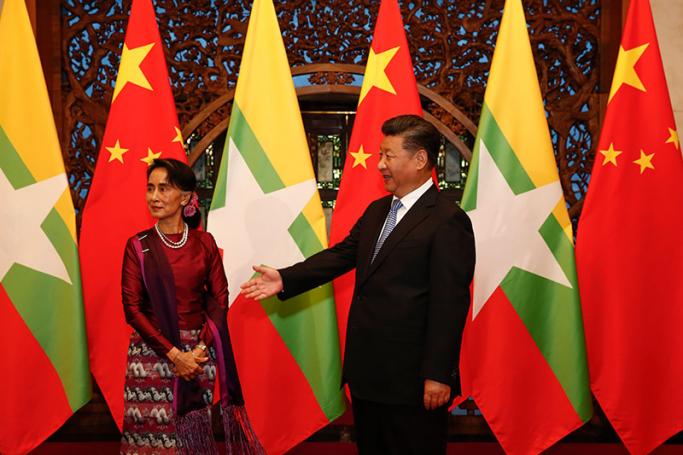During the recent formal visit to China, Myanmar State Counsellor Aung San Suu Kyi received an unusual high-level reception and visited three major cities. Many Chinese media and scholars noted that this trip was of great significance for the bilateral relations with Myanmar, and indicate the Suu Kyi government is implementing a more pragmatic foreign policy towards regional powers.
Myanmar State Counsellor Suu Kyi’s visit gained a lot of coverage in the Chinese media, generally positive. A key message to come over from the media was the good state of relations between Beijing and Nay Pyi Taw.
It is worth noting that after Beijing, Suu Kyi visited the western province Shaanxi, which is the starting point of ancient China’s Silk Road trade routes and also is the birthplace of China’s president Xi Jinping. “The itinerary reflects Suu Kyi is willing to promote the feeling of closeness from the highest ranks to local people,” commented by Ta Kun Pao, a veteran newspaper based in Hong Kong.
At the same time, the term “Baobo”, which means “brothers” in Burmese, was also repeatedly emphasized by both China’s president and prime minister during the meetings.
“I think this is a clear signal that after the democratic transition, China will play an important role in the Myanmar’s development process in the future,” Phoenix TV commented. “Now Suu Kyi is facing two important tasks, one is to achieve peace, one is to achieve development. But regardless of which task, China must be able to help her, it means that China would provide ‘positive energy’ for Myanmar definitely.”
Publishing similar views, the official news site ChinaNet (china.com.cn) commented that, “China and Myanmar signed several agreements about projects of livelihood. Suu Kyi takes the huge expectation of improving the living standards of people in Myanmar to visit China, while China also takes the full sincerity to help Myanmar … Cooperation in agriculture, water conservancy, education, medical and other fields will directly benefit the people's livelihood in Myanmar, and also can improve the image of China among the ordinary people.”
However, some Chinese analysts voiced concerns over the potential problems in future China-Myanmar relations.
In another analysis published by china.com.cn, concern was raised over dam projects: “Firstly, the Myitsone dam problem hasn’t been solved appropriately. The resistance from the masses in Myanmar is very large. And several other proposed hydropower projects near the Salween River also suffered loud protests.”
A group of 60 civil society groups in Yangon sent a letter to Chinese President Xi Jinping via China's embassy saying they hoped China was giving proper thought to their concerns.
"We believe the P. R. China will take into serious consideration the fact that the opinion of Myanmar's people has never been sought extensively enough since the Myitsone project was first conceived," the groups said in their letter.
The analysis article pointed out that China has to carefully consider that how to cooperate over hydropower projects with Myanmar in the future, and how to ensure the financial security of the large investment? “China's total investment in Myanmar is very large, but to some extent the security is not very hard. Myanmar occupies a vital geographical position, which is adjacent to the Indian Ocean, connecting the India, also connecting the South and Southeast Asia. So it’s important to get support from Myanmar if China wants to propel the Lancang - Mekong Cooperation (LMC) mechanism, the Bangladesh-China-India-Myanmar (BCIM) Economic Corridor and the One Belt, One Road (project) successfully,” the article said.
Secondly, the US, Japan, EU and other western countries have squeezed China’s benefit space in Myanmar in a long-term, which makes the future cooperation between the two countries subject to “third-party interference”. Myanmar plays an important role in America’s Asia-Pacific re-balancing strategy, the article said.
The article also accused the western media of deliberately writing about China's investment in Myanmar in a negative fashion. “Over recent years, the US, EU and Japan have successfully implanted many of their own ideologies into Myanmar’s social reform. So in the future, the economic cooperation between China and Myanmar maybe handicapped by their rules and is difficult to deal with,” said Song Qingrun, a researcher at the China Institute of Contemporary International Relations.
You are viewing the old site.
Please update your bookmark to https://eng.mizzima.com.
Mizzima Weekly Magazine Issue...
14 December 2023
Spring Revolution Daily News f...
13 December 2023
New UK Burma sanctions welcome...
13 December 2023
Spring Revolution Daily News f...
12 December 2023
Spring Revolution Daily News f...
11 December 2023
Spring Revolution Daily News f...
08 December 2023
Spring Revolution Daily News f...
07 December 2023
Diaspora journalists increasin...
07 December 2023












